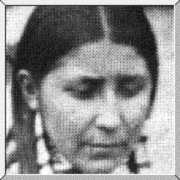 Susan
LaFlesche or Insta Theumba (her Omaha
name which translates to Bright Eyes in English) was the daughter of
Iron Eyes a chief of the Omaha Nation. She was educated at the
Hampton Institute and the Women's Medical College in Philadelphia,
Pennsylvania. She was one of the first Native American women
physicians in the United States of American. Following graduation she
worked as a physician on the Omaha reservation. There she treated
large numbers of cases of cholera, dysentery, influenza, tuberculosis
and insect born diseases not typically found in the rest of the
country.
Susan
LaFlesche or Insta Theumba (her Omaha
name which translates to Bright Eyes in English) was the daughter of
Iron Eyes a chief of the Omaha Nation. She was educated at the
Hampton Institute and the Women's Medical College in Philadelphia,
Pennsylvania. She was one of the first Native American women
physicians in the United States of American. Following graduation she
worked as a physician on the Omaha reservation. There she treated
large numbers of cases of cholera, dysentery, influenza, tuberculosis
and insect born diseases not typically found in the rest of the
country.
She became a social activist and often lectured about the conditions on Native American reservations. She especially spoke out against the General Allotment Act which allowed lands to be taken from Native Americans and transferred to others in the country.
As a physician, she successfully combined "modern" medical practice with Native American healing practice and formed a new branch of medicine, one which provides services in a culturally acceptable manner. Her methodology is still used in providing medical services to ethnic populations around the world. Susan LaFlesche died in 1903 at the age of 49.
References
Allen, P.G. (1989). Spider Woman's Granddaughters: Traditional Tales and Contemporary Writing by native American Women. Boston: Beacon Press.
Broker, I. (1983). Night Flying Woman: An Ojibwa narrative. St. Paul: Minnesota Historical Society Press.
Campbell, M. (1982). Halfbreed. Lincoln: University of Nebraska Press.
Crow Dog, M. (1990). Lakota Woman. New York: Harpers.
Ferrio, J. (1991). Native American Doctor: The Story of Susan LaFlesche Picotte. Minneapolis: Carolrhoda Books.
Green, R. (1992). Women in American Indian Society. New York: Chelsea House.
Roessel, R. (1981). Women in Navajo Society. Rough Rock, AZ: Navajo Resource Center.
Weatherford, J. (1988). Indian Givers: How the Indians of the Americas Transformed the World. New York: Fawcett Columbine.